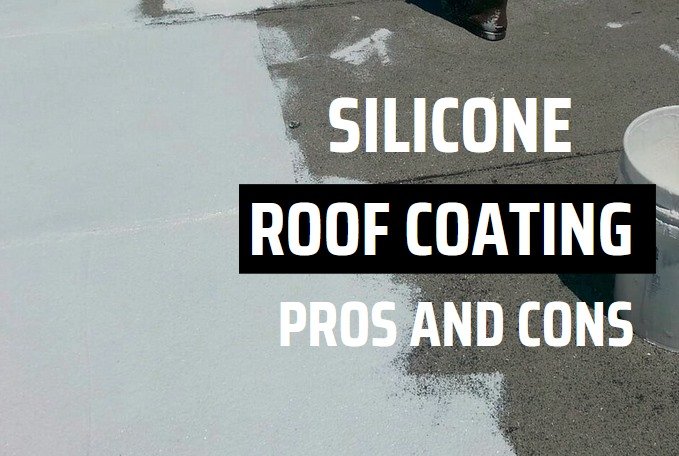The roof repair industry’s most common chemical type may be silicone roof coatings and for a good reason! A wide range of commercial roofing substrates, such as metal, modified bitumen, single-ply, EPDM, TPO, built-up roofs, concrete roof decks, and spray polyurethane foam, may be restored and protected using them.
There are a few silicone roof coating pros and cons to bear in mind while selecting the finest silicone roof coating. We analyze some important silicone roof coating advantages and disadvantages in detail below.
Is Silicone Roof Coating Worth It
The best silicone roof coating performs best when exposed to rain and standing water. Water cannot enter because of the silicone’s sealing ability. Additionally, silicone coatings may block up to 90% of the sun’s UV rays, keeping a structure cool and saving money on electricity.

Silicone Roof Coating Pros and Cons
Pros:
- Effortless
The cost of silicone roof coatings is around $6 less per square foot of roof than that of replacing the complete structure. In addition, silicone roof coating’s pros and cons offer a fair blend of robustness, quality, and waterproofing over other forms of roof coating.
- Durability
Because of their chemical makeup, silicone roof coverings can withstand more extreme circumstances than other varieties. Silicone won’t crack since it naturally expands and contracts with the roof. In addition, its elasticity and inorganic makeup contribute to its extended lifespan.
- Environment-friendly
One of the most environmentally friendly coating solutions is silicone roof coating. Compared to most other moisture curing treatments, the benefit of a silicone contain fewer solvents, and the high solids version is solvent-free.
- Lifespan
Roof coatings can extend a roof’s lifespan by more than ten years. Depending on their thickness, silicone coatings can provide 20 years of protection.
- Quick Application
Applying silicone roof coatings is quick and simple, it does not necessitate using heat-based techniques, which can be dangerous. In addition, because silicone roof coatings have a higher solids content than conventional coatings, they need fewer layers to function as an effective seal.
Cons:
- Over Time, the Roof Will Become Less Reflective
A silicone roof coating’s pros and cons will naturally retain the dirt it gathers daily. The rain then serves as a cleanser for the surface. However, it implies that the material will gradually lose its reflectivity with time, allowing more solar heat to enter the structure. In addition, your heating and cooling expenses will increase as this choice matures since its support has an entropic curve.
- When It’s Time to Replace It, You Must Remove the Surface
How long does silicone roof coating last? Since silicone is difficult for other roofing materials to cling to, you must either completely remove an old silicone roof coating or choose a solution compatible with the already-existing surface. When upgrading your roof, you will need to budget for a much higher installation cost if you choose option one. On the other hand, if the second choice is made accessible, you might have to pay extra if the product is a specialty one.
- When Utilizing This Surface, There Are More People Worried About Their Safety
Suppose you do have regular users of your roof. In that case, you should concentrate on raising their safety awareness to lower the possibility of accidents following the application of a silicone roof coating.
When the surface becomes somewhat damp, it becomes slicker than ordinary roofing systems. There should be increased awareness of this drawback if people working on skylights, roofs, or other units need access from the top.
- Stronger Warranties Are Offered for Other Types of Roofing
What is the value of silicone roof coating today? Most roofing solutions have a 25-year warranty to get the most out of your money. However, this warranty might be extended to 50 years or more if you choose a metal roof.
If you decide to use a silicone roof coating instead, the product may provide you with a 10-year warranty (or even longer in certain cases). But, at the same time, some suppliers may only offer you five years of security. So even if you qualify for tax deductions, you could discover that the upfront cost of this surface surpasses the range of advantages it might offer your building.
- An Incorrect Installation Might Harm Your Current Roof
When you need a silicone roof coating placed, you should only engage with licensed, bonded, and insured professionals. The business roof surface might end up protecting your building with more harm than good if the job is not done correctly.
A bonded contractor provides you with the finest alternative for a financial “out” that will enable you to overcome this disadvantage should it arise. To get the finest outcome, always look for the most respected businesses in your region specializing in this product.
Verdict on the Pros and Cons of a Silicone Roof Coating
When it comes to the silicone roof coating you may use for your roof, there are a lot of options. To determine what is required, you must consider the strengths and weaknesses of each structure. Although it costs more than most other options, a silicone roof coating gives you essential adaptability.
